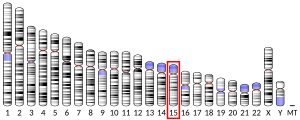DLL4
Appearance
Delta-like 4 is a protein that in humans is encoded by the DLL4 gene.[5][6]
This gene is a homolog of the Drosophila delta gene. The delta gene family encodes Notch ligands that are characterized by a DSL domain, EGF repeats, and a transmembrane domain.[6]
References
[edit]- ^ a b c GRCh38: Ensembl release 89: ENSG00000128917 – Ensembl, May 2017
- ^ a b c GRCm38: Ensembl release 89: ENSMUSG00000027314 – Ensembl, May 2017
- ^ "Human PubMed Reference:". National Center for Biotechnology Information, U.S. National Library of Medicine.
- ^ "Mouse PubMed Reference:". National Center for Biotechnology Information, U.S. National Library of Medicine.
- ^ Shutter JR, Scully S, Fan W, Richards WG, Kitajewski J, Deblandre GA, Kintner CR, Stark KL (June 2000). "Dll4, a novel Notch ligand expressed in arterial endothelium". Genes & Development. 14 (11): 1313–8. doi:10.1101/gad.14.11.1313. PMC 316657. PMID 10837024.
- ^ a b "Entrez Gene: DLL4 delta-like 4 (Drosophila)".
Further reading
[edit]- Yoneya T, Tahara T, Nagao K, Yamada Y, Yamamoto T, Osawa M, Miyatani S, Nishikawa M (January 2001). "Molecular cloning of delta-4, a new mouse and human Notch ligand". Journal of Biochemistry. 129 (1): 27–34. doi:10.1093/oxfordjournals.jbchem.a002832. PMID 11134954.
- Yan XQ, Sarmiento U, Sun Y, Huang G, Guo J, Juan T, Van G, Qi MY, Scully S, Senaldi G, Fletcher FA (December 2001). "A novel Notch ligand, Dll4, induces T-cell leukemia/lymphoma when overexpressed in mice by retroviral-mediated gene transfer". Blood. 98 (13): 3793–9. doi:10.1182/blood.V98.13.3793. PMID 11739188.
- Mailhos C, Modlich U, Lewis J, Harris A, Bicknell R, Ish-Horowicz D (December 2001). "Delta4, an endothelial specific notch ligand expressed at sites of physiological and tumor angiogenesis". Differentiation; Research in Biological Diversity. 69 (2–3): 135–44. doi:10.1046/j.1432-0436.2001.690207.x. PMID 11798067.
- Dorsch M, Zheng G, Yowe D, Rao P, Wang Y, Shen Q, Murphy C, Xiong X, Shi Q, Gutierrez-Ramos JC, Fraser C, Villeval JL (September 2002). "Ectopic expression of Delta4 impairs hematopoietic development and leads to lymphoproliferative disease". Blood. 100 (6): 2046–55. doi:10.1182/blood.V100.6.2046. PMID 12200365.
- Liu ZJ, Shirakawa T, Li Y, Soma A, Oka M, Dotto GP, Fairman RM, Velazquez OC, Herlyn M (January 2003). "Regulation of Notch1 and Dll4 by vascular endothelial growth factor in arterial endothelial cells: implications for modulating arteriogenesis and angiogenesis". Molecular and Cellular Biology. 23 (1): 14–25. doi:10.1128/MCB.23.1.14-25.2003. PMC 140667. PMID 12482957.
- Tohda S, Murata-Ohsawa M, Sakano S, Nara N (May 2003). "Notch ligands, Delta-1 and Delta-4 suppress the self-renewal capacity and long-term growth of two myeloblastic leukemia cell lines". International Journal of Oncology. 22 (5): 1073–9. doi:10.3892/ijo.22.5.1073. PMID 12684674.
- Shawber CJ, Das I, Francisco E, Kitajewski J (May 2003). "Notch signaling in primary endothelial cells". Annals of the New York Academy of Sciences. 995 (1): 162–70. Bibcode:2003NYASA.995..162S. doi:10.1111/j.1749-6632.2003.tb03219.x. PMID 12814948. S2CID 25058168.
- Lauret E, Catelain C, Titeux M, Poirault S, Dando JS, Dorsch M, Villeval JL, Groseil A, Vainchenker W, Sainteny F, Bennaceur-Griscelli A (April 2004). "Membrane-bound delta-4 notch ligand reduces the proliferative activity of primitive human hematopoietic CD34+CD38low cells while maintaining their LTC-IC potential". Leukemia. 18 (4): 788–97. doi:10.1038/sj.leu.2403288. PMID 14990974. S2CID 6608609.
- Zhang Z, Henzel WJ (October 2004). "Signal peptide prediction based on analysis of experimentally verified cleavage sites". Protein Science. 13 (10): 2819–24. doi:10.1110/ps.04682504. PMC 2286551. PMID 15340161.
- McKeane DP, Meyer J, Dobrin SE, Melmed KM, Ekawardhani S, Tracy NA, Lesch KP, Stephan DA (June 2005). "No causative DLL4 mutations in periodic catatonia patients from 15q15 linked families". Schizophrenia Research. 75 (1): 1–3. doi:10.1016/j.schres.2004.07.017. PMID 15820317. S2CID 42665216.
- Patel NS, Li JL, Generali D, Poulsom R, Cranston DW, Harris AL (October 2005). "Up-regulation of delta-like 4 ligand in human tumor vasculature and the role of basal expression in endothelial cell function". Cancer Research. 65 (19): 8690–7. doi:10.1158/0008-5472.CAN-05-1208. hdl:10026.1/10306. PMID 16204037.
- Patel NS, Dobbie MS, Rochester M, Steers G, Poulsom R, Le Monnier K, Cranston DW, Li JL, Harris AL (August 2006). "Up-regulation of endothelial delta-like 4 expression correlates with vessel maturation in bladder cancer". Clinical Cancer Research. 12 (16): 4836–44. doi:10.1158/1078-0432.CCR-06-0285. PMID 16914569.
- Lefort N, Benne C, Lelièvre JD, Dorival C, Balbo M, Sakano S, Coulombel L, Lévy Y (December 2006). "Short exposure to Notch ligand Delta-4 is sufficient to induce T-cell differentiation program and to increase the T cell potential of primary human CD34+ cells". Experimental Hematology. 34 (12): 1720–9. doi:10.1016/j.exphem.2006.08.007. PMID 17157169.
- Fung E, Tang SM, Canner JP, Morishige K, Arboleda-Velasquez JF, Cardoso AA, Carlesso N, Aster JC, Aikawa M (June 2007). "Delta-like 4 induces notch signaling in macrophages: implications for inflammation". Circulation. 115 (23): 2948–56. doi:10.1161/CIRCULATIONAHA.106.675462. PMID 17533181. S2CID 12333385.
- Hodkinson PS, Elliott PA, Lad Y, McHugh BJ, MacKinnon AC, Haslett C, Sethi T (September 2007). "Mammalian NOTCH-1 activates beta1 integrins via the small GTPase R-Ras". The Journal of Biological Chemistry. 282 (39): 28991–9001. doi:10.1074/jbc.M703601200. hdl:1842/4393. PMID 17664272.
- Zang S, Ji C, Qu X, Dong X, Ma D, Ye J, Ma R, Dai J, Guo D (2007). "A study on Notch signaling in human breast cancer". Neoplasma. 54 (4): 304–10. PMID 17822320.





